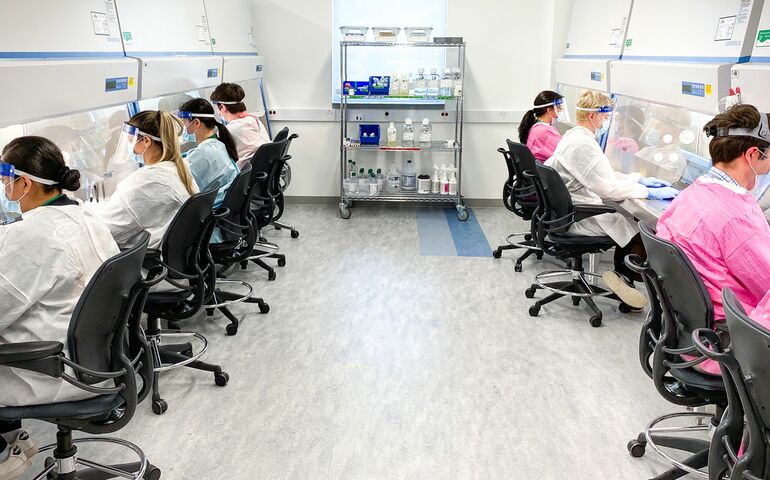Processing Your Payment
Please do not leave this page until complete. This can take a few moments.
- News
-
Editions
View Digital Editions
Biweekly Issues
- December 1, 2025
- Nov. 17, 2025
- November 03, 2025
- October 20, 2025
- October 6, 2025
- September 22, 2025
- + More
Special Editions
- Lists
- Viewpoints
-
Our Events
Event Info
Award Honorees
- Calendar
- Biz Marketplace
JAX receives $32M to tackle health issues, including coronavirus
 Courtesy / Jackson Laboratory
Inside the JAX Clinical Laboratory Improvement Amendments lab, which is working with the Yale School of Public Health to explore how to implement a saliva-based COVID-19 laboratory diagnostic test more broadly.
Courtesy / Jackson Laboratory
Inside the JAX Clinical Laboratory Improvement Amendments lab, which is working with the Yale School of Public Health to explore how to implement a saliva-based COVID-19 laboratory diagnostic test more broadly.
The Jackson Laboratory, headquartered in Bar Harbor, was awarded $32.4 million in grant funding over the year's second quarter to propel research and programs aimed at improving human health.
The funds are spread across 62 awards, which cover a broad range of the organization’s focus areas, including COVID-19 immunity research and model development, support of early-career scientists, addiction and overdose prevention, and the roots of peripheral nerve disorders, according to a news release.
Examples of JAX’s new funding include the following.
Respiratory conditions and COVID-19
Professor Karolina Palucka received $1.1 million from the National Institute of Allergy and Infectious Diseases as a supplement to an $11 million NIAID grant that was awarded in 2019. Palucka will focus on understanding the specific mechanisms of coronavirus infection, and the work will provide a solid foundation for therapy and vaccine development and refinement.
Scientific Director and Professor Nadia Rosenthal received two gifts from Tailwinds Foundation and Progress Charitable Foundation to develop humanized mouse strains for research into SARS-CoV-2 infection. In March, the lab announced it was delivering a transgenic mouse model that contains human susceptibility to the virus to the world’s research community.
Earlier this month, the lab announced it was partnering with Connecticut’s Yale School of Public Health to explore how to implement saliva-based COVID-19 laboratory diagnostic test more broadly.
Addiction
A $3.3 million grant from the National Institute on Drug Abuse was awarded to research scientist Jason Bubier, who works in the laboratory of Professor Elissa Chesler to study genetic variants that make some individuals more or less susceptible to opioid-induced respiratory depression, a key factor in overdose deaths.
Education and training
JAX received two highly sought after institutional training grants from the National Institutes of Health that provide graduate students and postdoctoral associates with the training they need to prepare for successful scientific careers.
A five-year, $3 million National Institute on Aging grant will train postdoctoral associates and predoctoral students in precision genetics of aging, Alzheimer’s disease, and related dementias.
A five-year, $1.2 million National Human Genome Research Institute grant led by University of Connecticut Professor Brenton Gravely and JAX director and Professor Charles Lee will fund a collaborative JAX/UConn genomic science training program in Connecticut.
Neuroscience
JAX Professor Rob Burgess was recognized with a Javits Neuroscience Investigator Award from the National Institute of Neurological Disorders and Stroke. The four-year, $2.8 million award supports Burgess’ investigation of dominant mutations in tRNA synthetase genes that cause diseases of the peripheral nervous system, such as Charcot-Marie-Tooth disease, to better understand the basis for these diseases and test possible pharmacological and gene therapy-based treatments.
Mainebiz web partners
Related Content

The Giving Guide
The Giving Guide helps nonprofits have the opportunity to showcase and differentiate their organizations so that businesses better understand how they can contribute to a nonprofit’s mission and work.
Learn More
Work for ME
Work for ME is a workforce development tool to help Maine’s employers target Maine’s emerging workforce. Work for ME highlights each industry, its impact on Maine’s economy, the jobs available to entry-level workers, the training and education needed to get a career started.
Learn More
Groundbreaking Maine
Whether you’re a developer, financer, architect, or industry enthusiast, Groundbreaking Maine is crafted to be your go-to source for valuable insights in Maine’s real estate and construction community.
Learn more-
The Giving Guide
The Giving Guide helps nonprofits have the opportunity to showcase and differentiate their organizations so that businesses better understand how they can contribute to a nonprofit’s mission and work.
-
Work for ME
Work for ME is a workforce development tool to help Maine’s employers target Maine’s emerging workforce. Work for ME highlights each industry, its impact on Maine’s economy, the jobs available to entry-level workers, the training and education needed to get a career started.
-
Groundbreaking Maine
Whether you’re a developer, financer, architect, or industry enthusiast, Groundbreaking Maine is crafted to be your go-to source for valuable insights in Maine’s real estate and construction community.
ABOUT
NEW ENGLAND BUSINESS MEDIA SITES
No articles left
Get access now
In order to use this feature, we need some information from you. You can also login or register for a free account.
By clicking submit you are agreeing to our cookie usage and Privacy Policy
Already have an account? Login
Already have an account? Login
Want to create an account? Register
Get access now
In order to use this feature, we need some information from you. You can also login or register for a free account.
By clicking submit you are agreeing to our cookie usage and Privacy Policy
Already have an account? Login
Already have an account? Login
Want to create an account? Register










0 Comments